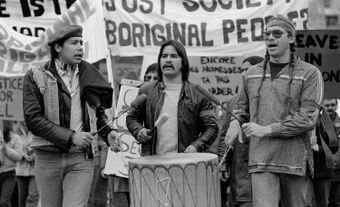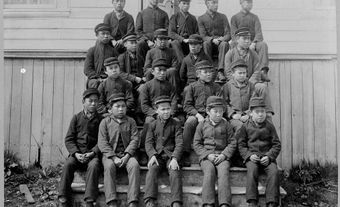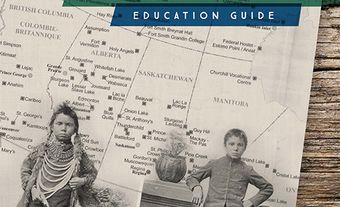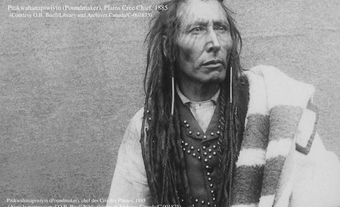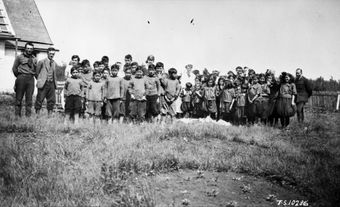Celebrated in Canada every 21 June, National Indigenous Peoples Day is an official day of celebration to recognize and honour the heritage, cultures and valuable contributions to society by First Nations, Inuit and Métis peoples. National Indigenous Peoples Day is the same day as the summer solstice (the longest day of the year) and was chosen for its important symbolism to many Indigenous peoples (see Religion and Spirituality of Indigenous Peoples in Canada.) This day has been celebrated as a statutory territorial holiday in the Northwest Territories since 2001 and in the Yukon since 2017.
History of National Indigenous Peoples Day
In 1982, the National Indian Brotherhood (now the Assembly of First Nations) first suggested establishing “National Aboriginal Solidarity Day” as a day of recognition. In 1990, Quebec became the first province or territory to establish 21 June as a day to celebrate Indigenous culture.
Tensions between Indigenous and non-Indigenous peoples in 1990 (see Oka Crisis) and 1995 (see Ipperwash Crisis) led to renewed calls for a national day of recognition. The Sacred Assembly, a national meeting of Indigenous and non-Indigenous spiritual leaders organized by Elijah Harper in 1995, encouraged the federal government to establish “National First Peoples Day” as a day of unity and acknowledgment. The Royal Commission on Aboriginal Peoples also recommended establishing a national day of recognition in their report, released in 1996.
On 13 June 1996, Governor General Roméo LeBlanc announced the government’s intention to have an annual, national celebration of Indigenous peoples. Later that month, on the 21st, Canada celebrated its first National Aboriginal Day.
In 2009, the House of Commons unanimously passed a motion to make the month of June National Aboriginal History Month (now National Indigenous History Month). This month-long awareness campaign highlights Indigenous history and cultures as well as contemporary issues in Indigenous communities across the country.
On 21 June 2017, Prime Minister Justin Trudeau announced plans to change the name of National Aboriginal Day to National Indigenous Peoples Day, reflecting a national and international preference for the term Indigenous, rather than Aboriginal, in most cases.
Action #80 of the Truth and Reconciliation Commission report called on the federal government to establish a statutory holiday to recognize the dark legacy of residential schools and to honour the survivors. On 3 June 2021, Bill C-5 created National Day for Truth and Reconciliation, commemorated annually on 30 September. It coincides with the Indigenous-led grassroots commemorative day, Orange Shirt Day, which also takes place on 30 September annually. (See also Reconciliation in Canada.)
Did You Know?
National Indigenous Peoples Day is a statutory territorial holiday in the Northwest Territories, established in 2001, to honour and acknowledge its Dene, Métis and Inuvialuit peoples. National Indigenous Peoples Day also became a statutory territorial holiday in the Yukon in May 2017.
Celebrating National Indigenous Peoples Day
Across Canada, the day is marked by ceremonies and celebrations that highlight cultural performances and activities, displays of arts and crafts, and events that recognize the contributions by Indigenous people.
The annual series of Celebrate Canada festivities begins with National Indigenous Peoples Day on 21 June, followed by St-Jean-Baptiste Day (La Fête nationale du Québec) on 24 June, Multiculturalism Day on 27 June, and Canada Day on 1 July (see Provincial and Territorial Holidays.)

 Share on Facebook
Share on Facebook Share on X
Share on X Share by Email
Share by Email Share on Google Classroom
Share on Google Classroom


